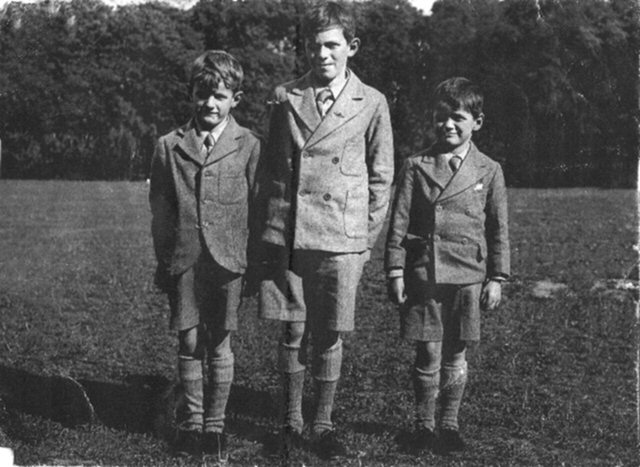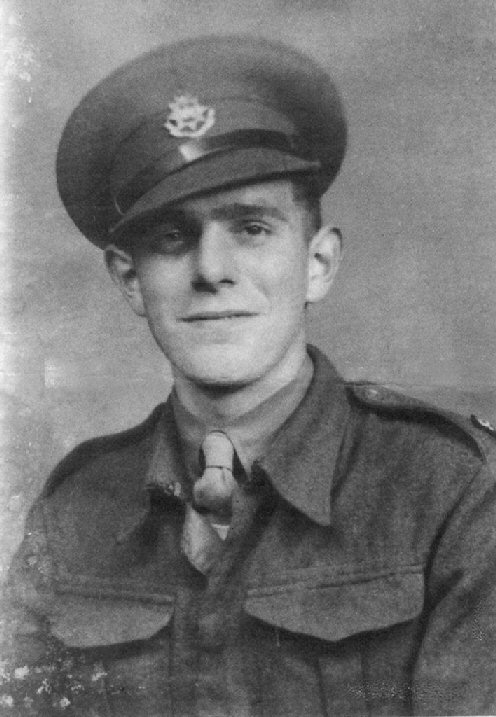Wounded in Action (N.W. Europe 1944-45) - 1st Battalion Worcestershire Regiment
Lieut. John Patrick Allum (299664)
(Pioneer Officer)
John Patrick Allum was born at Chiselhurst in 1924, the eldest son of Horace Benjamin Allum, C.B.E., M.V.O. and Mary Josephine Frances Allum (nee Dineen), of Whitstable, Kent. He had two younger brothers; gerald and Bernard.
After Preparatory S chool he was educated at City of London School (Victoria Embankment) and Marlborough Public School. He became a Junior Cadet and when he was just 16 also joined the Home Guard and became a Sergeant Instructor. He later moved to the Civil Defence as an Air Raid Warden which he did in his school holidays.
In 1942 he was selected as an Officer Cadet and commenced his training at the Royal Military College, Sandhurst. John Patrick Allum "Jack" was commissioned in to the East Surrey Regiment on the 13th November 1943. He spent some time in charge of a transit camp and also in Belfast, before being selected to go on an explosives course.
In July 1944 he was posted to active service in Normandy and on the 23rd July 1944 he was attached to the 1st Battalion Worcestershire Regiment in Normandy as the Pioneer Officer to replace the Lieut. George Alfred Kendall, the battalions prevous pioneer officer who had been evacuated wounded the month before. After the attack at Berjou he was evacuated to hospital on the 19th July 1944 due to sickness. He returned to the 1st Battalion a few days later.
Sadly he was later killed on the 24th January 1945 whilst clearing enemy mines forward of the village of Tripsrath, Germany. By some mischance, when the job was almost completed and over a 1100 mines had been removed, as he was lifting one of the last mines it blew up and he was killed instantly. He was just 20 years of age when he died. |
Lieut. John Patrick Allum (known as "Jack") |
Below is a letter written by his father Horace Benjamin Allum, C.B.E., M.V.O. about his eldest son John Patrick Allum "Jack" life to his nephew/niece:
"I now propose to tell you something of your Uncle (elder brother of your father) whose life, so full of promise, was cut short by the tragedy of the Second World War.
He was my eldest son, born at Chiselhurst in 1924. After receiving locally his Kindergarten and Preparatory school training he was accepted by the City of London School (Victoria Embankment) in 1939. In view of the presumed bombing of London in the early days of the war the school was evacuated to Marlborough where it was merged for educational purposes with the Public School of that same name.
Jack was already a Junior Cadet and soon made himself felt at Marlborough by his intense interest in everything calculated to thwart Hitler's determination to bring this country to her knees. He brought this interest home with him with him on his holidays and defying all the age rules (he was then only sixteen) joined the Home Guard and the Air Raid Warden Service. In the former, by virtue of his cadet training, he soon found himself a Sergeant Instructor teaching men twice or thrice his age the mysteries of the rifle.
During his work with the Home Guard he had the unique experience of witnessing the first daylight air raid by the Germans on Maidstone. Jack had been sent there with a lorry and driver to collect equipment from an Army Store and shortly after his arrival in that town the bombing started.
While he was relating his experiences to me that evening the thought occurred to me that the story told by the schoolboy concerned on the wireless to America, would make excellent war propaganda to that country. I approached the BBC who welcomed the idea and the broadcast was duly made by Jack the following evening. Remember he was only sixteen - what an experience for him!
Jack's service as a Service Instructor was of course purely voluntary and when he heard he was to be replaced by a paid Instructor he decided to leave the Home Guard and give his services to the Civil Defence as an Air Raid Warden. This often entailed all night vigils when he was supposed to be enjoying his school holiday!
His next step was to apply for and obtain a commission in the local Cadet Force whose Headquarters were at Eltham. Here he did excellent work in training juniors (not very much younger that himself) in discipline and the basic elements of military matters. One incident returns to my memory with vivid clearness. On Remembrance Day 1940 he marched at the head of his Cadets from Eltham to the Chiselhurst War Memorial where, after the flags had been dipped in salute, he recited from the base of that most beautiful pile the words of Bunyan "to the fallen". Little did he dream then that in a few years his own name would indeed be inscribed among others on the plinth of that very memorial. Perhaps you will see it for yourself one of these days.
Your father will be able to tell you of life at Marlborough during the War years. Ile and your Uncle Bernard were boarded with Mr and Mrs Simons to whom, by their kindness and understanding, they owe much. Jack, their elder brother, was boarded at a nearby cottage with two sisters named Bodman. During this time it was clear to his mother and me that Jack was fired with a determination to offer at the earliest moment his personal service as an active soldier. He was adamant in rejecting any suggestion that, when he joined the army, he should serve in a capacity, which would make the fullest use of his undoubted high intelligence. His reply was always this, "I intend to go into the fighting line with the infantry". This army was often referred to as the P.B.I. (poor bloody infantry).
And so it happened. As soon as he was eligible in age he volunteered for the army and was accepted Prior to enlistment he had served for about a year with John Mowlan and Co. the Building Contractors who thought very highly of him. In spite of his short service with them the firm made him a weekly allowance in augmentation of his army pay.
Jack's first posting was to Colchester in Essex and his mother and I visited him there in 1942. It was not long before the authorities became aware of his capacity for leadership and he was selected as an Officer Cadet and commenced his training for a commission. If my memory serves me, this having extended over a period of six months after which appeared before a Selection Board and emerged as a Second lieutenant in His Majesty's forces. This was a very proud moment for him and I can recall how proud we were when he presented himself to us at Chiselhurst in his officer's uniform.
The young officer then commenced a very rigorous and varied assignment of duties. Bound by oaths of secrecy he told us very little of his work when he saw us on his brief spells of leave. But I recall that amongst other duties he was in charge of a transit camp which had to be ready at short notice to feed a battalion en route from one place to another. He made night journeys by road from the South to North of England. He was in Belfast from whence he flew to Liverpool and eventually took a course where he learnt all about explosives." (This, unfortunately is where the letter finished.)

Happier days John Patrick Allum (centre) with his younger brothers Gerald (left) and Bernard (right)

